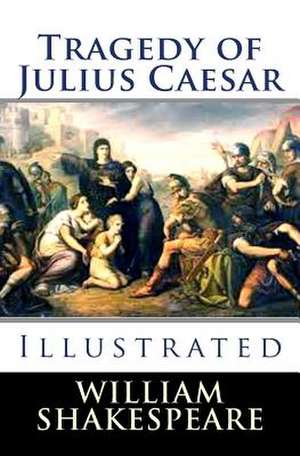Tragedy of Julius Caesar
Autor William Shakespeare Ilustrat de Murat Ukrayen Limba Engleză Paperback
| Toate formatele și edițiile | Preț | Express |
|---|---|---|
| Paperback (11) | 47.86 lei 3-5 săpt. | |
| CreateSpace Independent Publishing Platform – | 47.86 lei 3-5 săpt. | |
| CreateSpace Independent Publishing Platform – | 53.57 lei 3-5 săpt. | |
| Simon&Schuster – 31 dec 2010 | 63.48 lei 3-5 săpt. | |
| CreateSpace Independent Publishing Platform – | 66.40 lei 3-5 săpt. | |
| Hackett Publishing Company – 14 mai 2007 | 67.73 lei 3-5 săpt. | |
| Outlook Verlag – 11 oct 2022 | 260.06 lei 3-5 săpt. | |
| 1ST WORLD LIB INC – 31 oct 2005 | 70.41 lei 6-8 săpt. | |
| Serenity Publishers, LLC – 9 oct 2020 | 82.16 lei 6-8 săpt. | |
| Throne Classics – 8 iul 2019 | 102.28 lei 38-44 zile | |
| LIGHTNING SOURCE INC – 16 mai 2018 | 108.53 lei 17-23 zile | |
| LIGHTNING SOURCE INC – 16 mai 2018 | 128.43 lei 17-23 zile | |
| Hardback (3) | 164.72 lei 6-8 săpt. | |
| 1ST WORLD LIB INC – 31 oct 2005 | 164.72 lei 6-8 săpt. | |
| Throne Classics – 8 iul 2019 | 172.37 lei 38-44 zile | |
| Prince Classics – 23 mai 2019 | 172.37 lei 38-44 zile |
Preț: 67.46 lei
Nou
Puncte Express: 101
Preț estimativ în valută:
12.91€ • 13.43$ • 10.80£
12.91€ • 13.43$ • 10.80£
Carte indisponibilă temporar
Doresc să fiu notificat când acest titlu va fi disponibil:
Se trimite...
Preluare comenzi: 021 569.72.76
Specificații
ISBN-13: 9781502490803
ISBN-10: 1502490803
Pagini: 154
Dimensiuni: 133 x 203 x 9 mm
Greutate: 0.18 kg
ISBN-10: 1502490803
Pagini: 154
Dimensiuni: 133 x 203 x 9 mm
Greutate: 0.18 kg
Notă biografică
William Shakespeare was born in April 1564 in the town of Stratford-upon-Avon, on England's Avon River. When he was eighteen, he married Anne Hathaway. The couple had three children-an older daughter Susanna and twins, Judith and Hamnet. Hamnet, Shakespeare's only son, died in childhood. The bulk of Shakespeare's working life was spent in the theater world of London, where he established himself professionally by the early 1590s. He enjoyed success not only as a playwright and poet, but also as an actor and shareholder in an acting company. Although some think that sometime between 1610 and 1613 Shakespeare retired from the theater and returned home to Stratford, where he died in 1616, others believe that he may have continued to work in London until close to his death.
Barbara A. Mowat is Director of Research emerita at the Folger Shakespeare Library, Consulting Editor of Shakespeare Quarterly, and author of The Dramaturgy of Shakespeare's Romances and of essays on Shakespeare's plays and their editing.
Paul Werstine is Professor of English at the Graduate School and at King's University College at Western University. He is a general editor of the New Variorum Shakespeare and author of Early Modern Playhouse Manuscripts and the Editing of Shakespeare and of many papers and articles on the printing and editing of Shakespeare's plays.
Barbara A. Mowat is Director of Research emerita at the Folger Shakespeare Library, Consulting Editor of Shakespeare Quarterly, and author of The Dramaturgy of Shakespeare's Romances and of essays on Shakespeare's plays and their editing.
Paul Werstine is Professor of English at the Graduate School and at King's University College at Western University. He is a general editor of the New Variorum Shakespeare and author of Early Modern Playhouse Manuscripts and the Editing of Shakespeare and of many papers and articles on the printing and editing of Shakespeare's plays.
